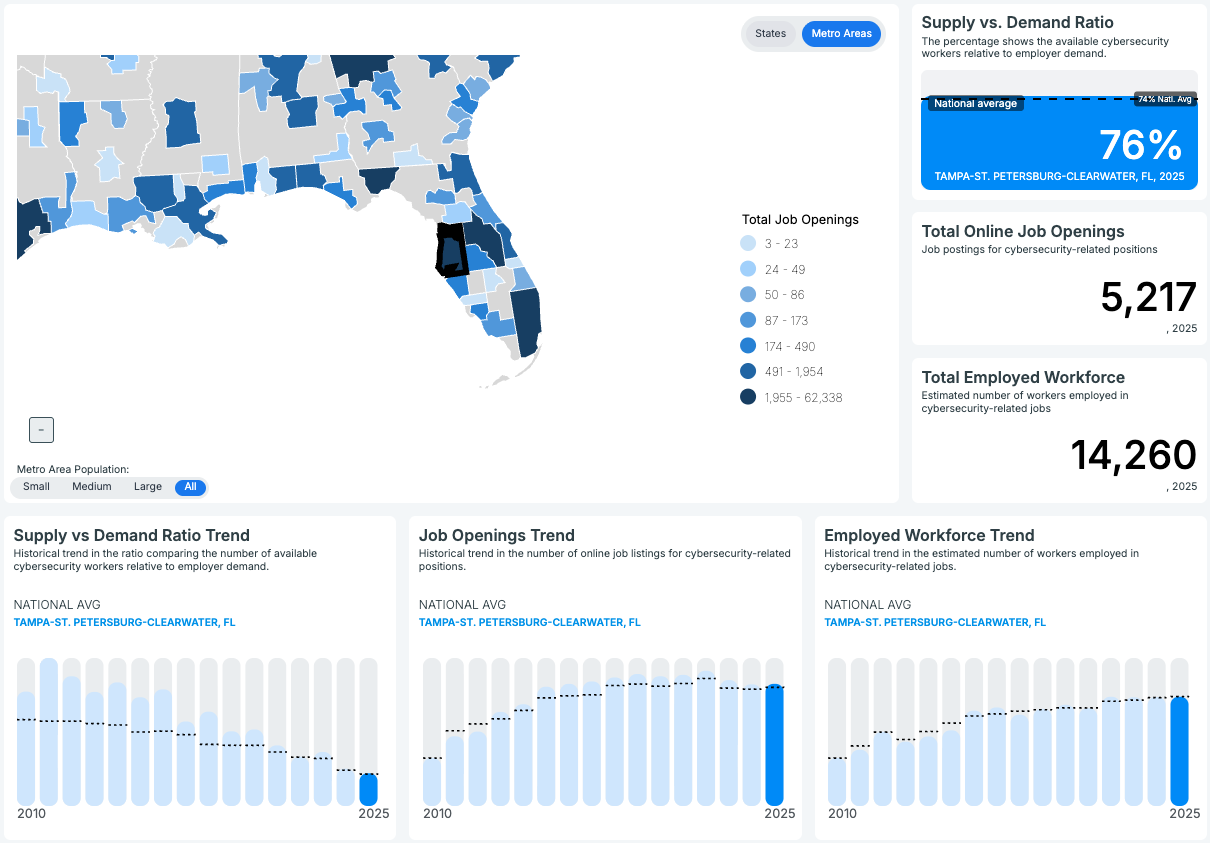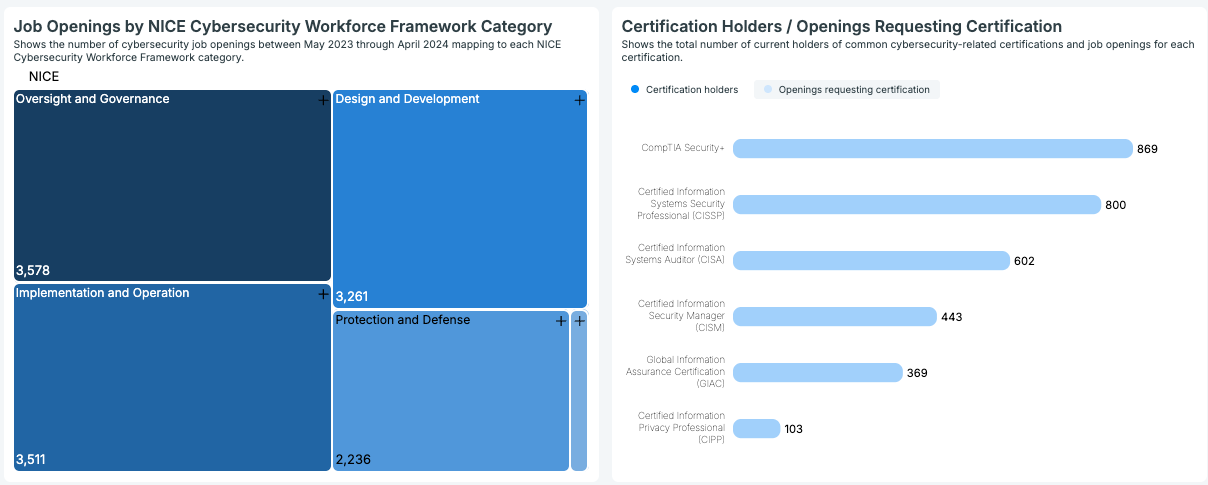Tampa, Florida, including the metropolitan areas of St. Petersburg and Clearwater, is a burgeoning hub for cybersecurity opportunities. These opportunities are driven by the presence of major employers like Raymond James Financial, Tech Data, and Jabil. These companies and the region’s defense contractors and healthcare institutions create a strong demand for cybersecurity professionals.
The area also has several prominent universities (see the full school listing below), such as the University of South Florida (USF), which offers comprehensive cybersecurity programs through its College of Engineering and Cybersecurity Education Programs.
Additionally, institutions like St. Petersburg College and the University of Tampa provide specialized training and degrees in cybersecurity, making Tampa an ideal location for students and early career professionals to launch their careers in this critical field.
Cybersecurity overview
The cybersecurity landscape in the Tampa, St. Petersburg, and Clearwater metropolitan areas is vibrant and rapidly growing, reflecting the increasing demand for skilled professionals.
According to the latest data from Cyberseek, the region has over 5,217 cybersecurity job openings, with a total cybersecurity workforce approaching 15,000 professionals.
This robust job market is fueled by the presence of major financial institutions, technology companies, healthcare providers, and defense contractors, all of which require sophisticated cybersecurity measures to protect sensitive data and systems. The area’s strategic location and growing tech industry make it an attractive destination for cybersecurity talent.
Employers in the Tampa metro area actively seek professionals with a range of certifications and degrees that demonstrate their expertise and readiness to tackle cybersecurity challenges.
The most commonly sought-after certifications include CompTIA Security+, Certified Information Systems Security Professional (CISSP), and Global Information Assurance Certification (GIAC). These certifications are highly valued as they cover various aspects of cybersecurity, from technical skills to management and auditing capabilities.
In terms of academic qualifications, degrees in cybersecurity, information technology, computer science, and related fields are highly desirable. The University of South Florida (USF) stands out with its well-regarded cybersecurity programs, offering bachelor’s and master’s degrees in cybersecurity and related disciplines.
St. Petersburg College and the University of Tampa also offer specialized programs that equip students with the practical skills and theoretical knowledge needed to succeed in the cybersecurity industry.
These institutions provide a strong educational foundation that, when combined with industry-recognized certifications, positions graduates for success in Tampa’s dynamic cybersecurity job market.


Cybersecurity program listings in Tampa
- Program: Network Security AS
Cost per credit: $104 in-state | $380 out-of-state
Program: Associate's
Credits: 60
Delivery Method: Hybrid
Learn more: Program details - Program: Cybersecurity Operations AS
Cost per credit: $104 in-state | $380 out-of-state
Program: Associate's
Credits: 60
Delivery Method: Hybrid
Learn more: Program details - Program: Cybersecurity AS
Cost per credit: $104 in-state | $380 out-of-state
Program: Associate's
Credits: 60
Delivery Method: Hybrid
Learn more: Program details - Program: Cybersecurity A.S. Degree
Cost per credit: $112 in-state | $387 out-of-state
Program: Associate's
Credits: 60
Delivery Method: Online
Learn more: Program details - Program: Cybersecurity B.A.S.
Cost per credit: $112 in-state | $387 out-of-state
Program: Bachelor's
Credits: 60
Delivery Method: Online
Learn more: Program details - Program: B.S. in Information Assurance and Cybersecurity Management
Cost per credit: $214 in-state | $577 out-of-state
Program: Bachelor's
Credits: 120
Delivery Method: Campus
Learn more: Program details - Program: BS in Cybersecurity
Cost per credit: $214 in-state | $577 out-of-state
Program: Bachelor's
Credits: 120
Delivery Method: Campus
Learn more: Program details - Program: BS in Cybersecurity
Cost per credit: $664
Program: Bachelor's
Credits: 84
Delivery Method: Campus
Learn more: Program details - Program: M.S. in Information Assurance and Cybersecurity Management
Cost per credit: $436 in-state | $881 out-of-state
Program: Master's
Credits: 30
Delivery Method: Campus
Learn more: Program details - Program: Cybersecurity, M.S.C.Y.S.
Cost per credit: $436 in-state | $881 out-of-state
Program: Master's
Credits: 30
Delivery Method: Campus
Learn more: Program details - Program: M.S. in Cybersecurity
Cost per credit: $709
Program: Master's
Credits: 32-40
Delivery Method: Campus
Learn more: Program details - Program: MBA with Concentration in Cybersecurity
Cost per credit: $497 - $750
Program: MBA
Credits: 33-49
Delivery Method: Online
Learn more: Program details - Program: MBA Cybersecurity Concentration
Cost per credit: $709
Program: MBA
Credits: 16
Delivery Method: Campus
Learn more: Program details - Program: Professional MBA Cybersecurity Concentration
Cost per credit: $709
Program: MBA
Credits: 60
Delivery Method: Campus
Learn more: Program details - Program: Cybersecurity Analytics Bootcamp
Cost per credit: $14,995
Program: Bootcamp
Credits: 12 to 26 weeks
Delivery Method: Online
Learn more: Program details - Program: Cybersecurity Bootcamp
Cost per credit: $10,900
Program: Bootcamp
Credits: 6 months
Delivery Method: Online
Learn more: Program details - Program: Cyber Security Essentials
Cost per credit: $975
Program: Certificate
Credits: 34 courses
Delivery Method: Online
Learn more: Program details - Program: Cybersecurity Certificate
Cost per credit: $123 in-state | $426 out-of-state
Program: Certificate1
Credits: 18
Delivery Method: Online
Learn more: Program details - Program: Cyber Intelligence Graduate Certificate
Cost per credit: $436 in-state | $881 out-of-state
Program: Certificate
Credits: 18
Delivery Method: Online
Learn more: Program details - Program: Graduate Certificate in Cybersecurity
Cost per credit: $709
Program: Certificate
Credits: 12-20
Delivery Method: Campus
Learn more: Program details
The Tampa metropolitan area boasts a diverse array of academic institutions offering robust cybersecurity degree programs designed to prepare students for successful careers in the industry.
The University of South Florida (USF) is a key player, offering a range of programs, including the M.S. in Information Assurance and Cybersecurity Management, the Cybersecurity MSCYS, and a BS in Cybersecurity.
These programs are tailored to provide both theoretical knowledge and practical skills, ensuring graduates are well-equipped to address current and emerging cybersecurity challenges. USF’s comprehensive curriculum and state-of-the-art facilities make it a leading choice for aspiring cybersecurity professionals.
The University of Tampa also offers competitive programs with its BS in Cybersecurity, M.S. in Cybersecurity, and Professional MBA with a Cybersecurity Concentration. These programs emphasize a blend of technical expertise and business acumen, preparing graduates to understand and mitigate cyber threats and manage and strategize cybersecurity initiatives within organizations.
The inclusion of a cybersecurity concentration within the Professional MBA program is particularly beneficial for those looking to integrate cybersecurity expertise with broader business leadership skills.
St. Petersburg College provides accessible and flexible options for those pursuing cybersecurity education, with its Cybersecurity A.S. Degree and Cybersecurity B.A.S. These programs are designed to cater to both entry-level students and those seeking to advance their careers.
The Associate’s degree offers foundational knowledge and skills, while the Bachelor’s degree builds on this foundation with more advanced coursework and practical experience. Students and professionals looking to gain a comprehensive education in cybersecurity will find these programs particularly appealing.
Resources
- Florida Center for Cybersecurity – focuses on education, research, and outreach efforts, offering resources such as free training, conferences, and podcasts to make Florida a cybersecurity leader.
- Tampa Bay Chapter of ISSA – a collaborative environment for senior-level cybersecurity executives. They provide educational forums, publications, and peer interactions to enhance knowledge, skills, and professional growth.
- MCPA – Tampa – a non-profit that supports veterans and provides educational resources for the military cyber community.
- CyberTech | X Accelerator – a specialized 90-day accelerator program called CyberTech|X Accelerator for technology startups in the cybersecurity industry. Participants receive support, networking opportunities, and coaching from cybersecurity experts.
- Florida Cyber Alliance – a non-profit organization dedicated to building a security community and workforce throughout Florida.
- Tampa Bay Tech – a non-profit organization dedicated to bringing together and supporting the local technology community for over two decades.
Salary Landscape in Tampa
Crowd-sourced salary data provides a somewhat varied, but generally consistent, picture of compensation for an Information Security Analyst in the Tampa, Florida area.
Indeed lists the average annual salary at approximately $81.7k (the search results actually indicate a slightly higher average of $85,630), while a cross-check with ZipRecruiter suggests a more optimistic average of $91.3k (the search results show $91,338).
Role & Skills Breakdowns
In-demand roles closely mirror national trends but are concentrated within Tampa’s primary industries:
- Security Analyst: Focus on Security Operations Center (SOC) duties, monitoring, threat detection, and incident handling.
- Security Engineer: Development and implementation of security infrastructure, system hardening, and architecture.
- Cyber Security Lead/Manager: Often found in the defense contracting and large financial services sector, requiring strategic planning and team management.
- SCADA Cyber Security Engineer: Specialized roles in critical infrastructure (like water/wastewater management).
Employers frequently seek skills related to modern infrastructure and advanced threat defense:
- Cloud Security: Expertise in securing cloud platforms (AWS, Azure, Google Cloud) is highly valued, including configuration, identity management, and compliance in the cloud.
- Incident Response & Forensics: The ability to swiftly and effectively detect, analyze, and mitigate cyber incidents, often using SIEM/SOAR tools like Splunk and Elastic.
- Threat Intelligence: Proactive analysis of threat actors and techniques, leveraging threat data to improve security posture.
- Identity and Access Management (IAM/CIAM).
Certification Preferences by Local Employers
While experience is key, certifications are essential for establishing competence, particularly for government/defense contractors.
- Core: CompTIA Security+ (often required for entry/junior roles, especially in the defense sector).
- Mid-Level/Specialist: Certified Ethical Hacker (CEH), Systems Security Certified Practitioner (SSCP).
- Advanced: CISSP (Certified Information Systems Security Professional) for senior and management roles.
- Vendor-Specific: Certifications for Splunk, Palo Alto Networks, and Cloud platforms (e.g., AWS Certified Security – Specialty).
Source
- Cybersecurity supply/demand information | Sourced from Cyberseek in Oct 2025
- Infosec Analyst salary info | Sourced from Indeed and ZipRecruiter in Oct 2025